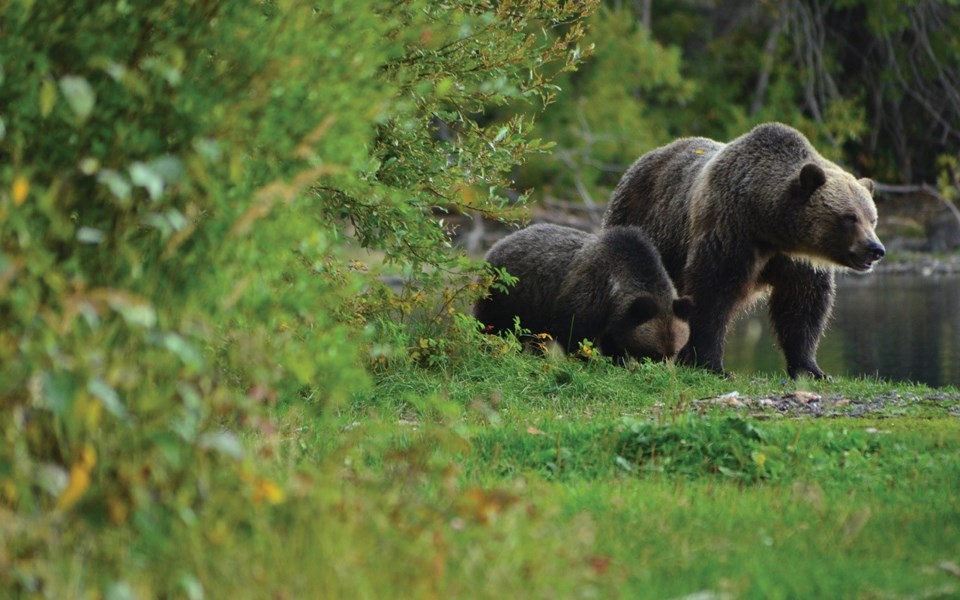A well-known grizzly bear scientist is warning that the pickup location for BC Parks' new Joffre Lakes Provincial Park shuttle bus could result in dire consequences for a critically endangered grizzly bear population.
"Right near that parking lot [at Duffey Lake Park] are huge avalanche chutes and they were heavily used by bears in the spring," said Michelle McLellan, a biologist who has been studying the Stein-Nahatlatch Grizzly Bear Population since 2005 as part of her doctoral studies.
BC Parks' new shuttle bus system—established by the agency this summer as a way to stop people from illegally parking on the side of the highway—is increasing the number of people who travel to the remote Duffey Lake Park parking lot, said McLellan.
"There's just so many people—there are hundreds," she said. "If it was 30 people, maybe. But hundreds will displace bears for sure."
McLellan recently sent a letter to BC Parks, explaining that areas along the stretch of highway between Joffre Lake Park and Duffey Lake Park are "particularly important for grizzly bear recovery and population connectivity."
According to McLellan, the Stein-Nahatlatch grizzly bear population—which is bordered by the Lillooet and Fraser rivers and capped off by Anderson and Seton Lakes to its north—has "at max 20 bears."
The highly isolated population faces alarmingly high rates of cub and adult mortality and is one of the "most threatened populations" in the province, said McLellan.
Facilitating safe travel within the population unit is therefore seen as critical to the recovery of the population.
It is hoped that grizzlies will eventually travel south (from the much healthier South Chilcotin grizzly bear population unit) and repopulate the Stein-Nahatlach.
"We can do a little bit of management to try to help [the population], but anything long-term will require connectivity," said McLellan.
As part of her studies, McLellan completed a "connectivity analysis" using information gathered from the South Chilcotin and Stein-Nahatlatch population units that predicts where grizzlies would be most likely to cross the Duffey (none are thought to have crossed in recent years).
Of the three most likely places, one is near the head of Duffey Lake (around where the parking lot is), while another is near the weather station on the highway.
McLellan is therefore concerned that increased human traffic will discourage grizzlies from crossing the highway or habituate them to human food.
Littering has been a persistent problem at Joffre Lakes Park in recent years. In 2018, two hikers collected about 18 kilograms of discarded containers, beer cans, and camping equipment that had been hidden next to the trail.
"Moving [people] into the middle of good bear habitat is just a bad idea," said McLellan. "There is tons of literature that shows that habituation of bears is not good. The long-term outcome is that a lot of them eventually get killed."
McLellan would like to see the pickup location set somewhere between Pemberton and Joffre Lakes Park.
"I would say somewhere west of Joffre Lakes would be better," said McLellan.
In an email statement to Pique, BC Parks said it has received McLellan's email and has followed up with her by phone.
"Based on this conversation, we will continue to run the shuttle from the Duffey Lake lot to Joffre Lakes Park for this summer but will consider alternative locations if the shuttle continues into future years," said BC Parks.
"We understand that the primary concerns are around the long-term use of this area ... and with continued careful control and management of access and garbage in the parking area impacts are not expected in the short term."
For Johnny Mikes, field director for the Coast to Cascades Grizzly Bear Initiative (a group dedicated to recovering grizzly bear populations in the region), the shuttle-bus issue highlights the need for stakeholders to approach decision making in a thoughtful, concerted manner.
"When we look at the demand and interest in hiking by the general public, and with the Duffey Lake corridor certainly being close to Whistler, Pemberton and Squamish, but also within striking range to Vancouver, one can only assume that demand for trails and hiking is going to increase [in the area]," said Mikes.
It is therefore critical for relevant provincial agencies to work in coordination with First Nations and conservation organizations, he said.
The goal should be to plan trails that have the "least amount of impact possible on values like wildlife, First Nations cultural values, and anything else," said Mikes.
He understands why the shuttle bus pickup was placed at Duffey Lake Park, given its location east of Joffre Lakes Park. But at the end of the day, he would like to see it relocated.
"It happens to be located in one of the best potential grizzly bear crossing zones in that whole highway corridor," he said.
– Joel Barde, Pique Newsmagazine



